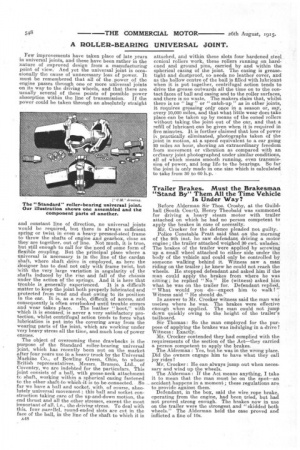Trailer Brakes. Must the Brakesman "Stand By" Them All the Time Vehicle Is Under Way?
Page 18

If you've noticed an error in this article please click here to report it so we can fix it.
Before Alderman Sir Thos. Crosby, at the Guildhall (South Court), Henry Theobald was summoned for driving a hea,ey steam motor with trailer attached on which he had no person competent to apply the brakes in case of necessity. M. Crocker for the defence pleaded not guilty. Police Constable Pratt said that on the morning of the 9th inst. he saw defendant driving a motor engine ; the trailer attached weighed 30 cwt. unladen: The brakes of the trailer Were applied by screwing up a small wheel attached to either side under the body of the vehicle and could only be controlled by someone walking behind it. Witness saw a man riding on the trailer; he knew he could not reach the wheels. He stopped defendant and asked him if the man could apply the brakes from where he was sitting ; he replied "No," He (witness) asked him what he was on the trailer for. Defendant replied, "What would you do—expect him to walk? " Witness said "He should do.
In answer to Mr. Crocker witness said the man was useless where he was. The brakes were effective enough .when applied. The man could not jump down quickly owing to the height of the trailer's tailboard.
Sir Thomas : SG the man employed for the purpose of applying the brakes was indulging in a drive? Witness : Exactly.
Mr. Crocker contended they had complied with the requirements of the section of the Act—they carried a person competent to apply the brakes. The Alderman : Yes, but he was in the wrong place. Did the owners engage him to have what they call joy rides ? Mr. Crocker : He can always jump out when necessary and wind up the wheels. The Alderman : If the Act means anything, I take it to mean that the man must be on the spot—an accident happens in a moment ; these regulations aro to provide against them: Defendant, in the box, said the wire rope brake, operating from the engine, had been tried, but had not proved strong enough. The brakes now in use on the trailer were the strongest and "skidded both wheels." The Alderman held the case proved and inflicted a fine of 10s,






















